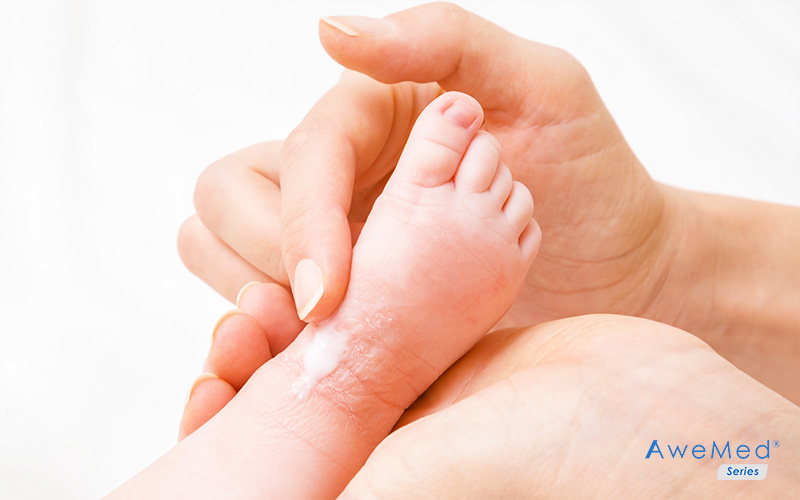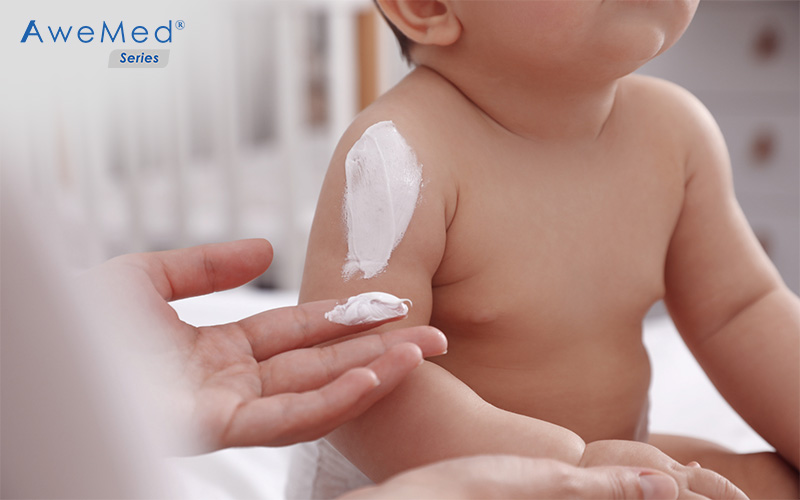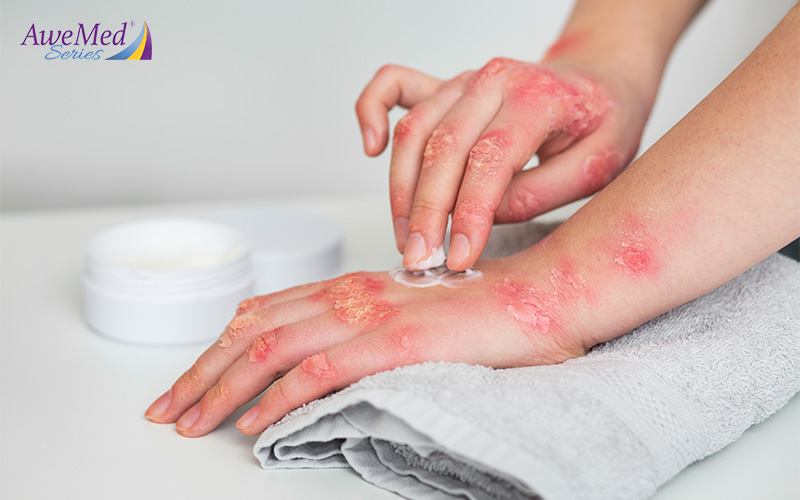Is your child suffering from eczema? It is a discomforting condition for both children and parents. But don’t worry! With the right approach, you can make a world of a difference, especially when managing flare-ups and irritation. Keep in mind that products containing steroids may carry potential long-term risks for children’s sensitive skin, making steroid-free eczema solutions will be a thoughtful choice. This guide sheds light on practical solutions, skincare routine tips, and the support a child needs for healthy skin.
Key Eczema Solutions for Kids
Choosing the right product plays an important role in protecting your child’s skin from eczema. Here’s what you need to look for:
-
Moisturizers:
Look for a moisturizer for itchy skin that retains hydration and prevents irritants. Using it regularly will protect your child’s skin barrier while maintaining its softness.
-
Bath Additives:
Incorporating emollient-rich bath oils into your child’s skincare routine can help cleanse and hydrate their skin, minimising overall dryness.
-
Trigger Avoidance:
Identifying and avoiding irritants like specific ingredients or harsh soaps can help prevent flare-ups.
Don’t always rely on home remedies or DIY eczema solutions. In cases of severe symptoms, it is best to consult a paediatrician.

Tips for Daily Eczema Management
Moisturise Regularly
One of the most important steps in a treatment for eczema in children is to ensure that your child’s skin remains hydrated. Apply a moisturiser right after bathing to lock in moisture and prevent skin from becoming dry, which can trigger eczema flare-ups. It’s best to choose a fragrance-free moisturiser designed for sensitive skin, and apply it regularly throughout the day to keep the skin soft and hydrated.
Choose Gentle Skin Care Products
Selecting gentle, skin-friendly products is crucial for children with eczema. Opt for body washes and shampoos that are free from fragrances and harsh chemicals. These products are less likely to irritate the skin. When considering a treatment for eczema in children naturally, look for skin care options that hydrate without causing further dryness or discomfort.
Dress Your Child in Comfortable Fabrics
Clothing can have a significant impact on eczema. Tight-fitting, rough, or synthetic fabrics can irritate sensitive skin, leading to flare-ups. To reduce discomfort, choose soft, breathable fabrics like cotton that allow the skin to breathe. Loose-fitting clothes will also help reduce friction and prevent further irritation.
Maintain a Consistent Skin Care Routine
Developing a daily skin care routine is important for managing eczema. Use lukewarm water for bathing and avoid hot water, as it can dry out the skin. After each bath, always apply a suitable moisturiser to help keep the skin hydrated. A consistent routine is essential for treatment for eczema in children, helping to maintain the skin’s moisture balance and minimise the risk of flare-ups.
Avoid Known Triggers
Environmental factors, such as allergens or temperature changes, can worsen eczema. Identifying and avoiding these triggers can help reduce flare-ups. Common triggers include pet dander, dust mites, and certain foods. Keeping track of symptoms and potential triggers can help parents manage the condition more effectively.
Monitor Diet and Allergies
Food allergies can sometimes exacerbate eczema. Keep an eye on your child’s diet and note any foods that may cause symptoms to worsen. Common allergens such as dairy, eggs, and nuts could be potential triggers. Consulting a healthcare provider or allergist can help identify dietary triggers and create a suitable diet plan to support treatments for eczema in children.
Create a Calm, Stress-Free Environment
Stress can contribute to eczema flare-ups, so it’s important to create a calm, stress-free environment for your child. Encourage relaxation techniques, such as deep breathing or gentle activities, that can help reduce stress levels. A calm atmosphere supports both emotional and physical well-being, which can be beneficial for managing eczema and complementing a treatment for eczema in children.
Choosing Steroid-Free Products for Eczema
The more natural your product is, the better it is for your child’s skin. Let’s take a look at what your eczema solutions should include to address this irritating skin condition:
- Hydrating Creams and Ointments: These products help restore the skin’s natural barrier and relieve itchiness.
- Eczema Sprays: Ideal for targeting small, irritated patches, these eczema sprays provide mess-free, focused short-term itch relief.
- pH-Balanced Cleansers: Body washes free from parabens, fragrances, and other harsh chemicals are a must for sensitive skin.
Checking reviews and consulting a dermatologist can guide you in selecting the most suitable kids’ eczema relief products.

When to Seek Professional Advice
Frequent or Increasing Flare-Ups
If your child is experiencing recurring flare-ups or if the condition worsens over time, despite the use of regular treatments, it might be time to consult a dermatologist. Seeking treatment for eczema in children from a professional can help manage symptoms more effectively and reduce the likelihood of persistent irritation.
Open or Infected Sores from Scratching
Excessive scratching can break the skin, leading to open sores or potential infections. If your child develops any open wounds or shows signs of infection—such as redness, swelling, or pus—it’s important to seek medical advice. A dermatologist can offer appropriate treatment for eczema in children to help heal the skin and prevent further complications.
Chronic Discomfort Interfering with Sleep
Eczema can cause significant discomfort, particularly at night when symptoms may intensify. If your child’s eczema is causing persistent itching or pain that disrupts their sleep, seeking professional care is advisable. A dermatologist can provide a treatment for eczema that addresses the discomfort, allowing your child to rest better.
Severe Dryness or Thickened Skin
In some cases, eczema can cause extreme dryness or lead to thickened, leathery skin. If your child’s skin becomes excessively dry or begins to thicken, it may indicate the need for more targeted care. For children, a healthcare provider can recommend specific treatment for eczema to improve the skin’s texture and overall health.
Limited Response to Over-the-Counter Treatments
While over-the-counter creams and ointments may offer relief for mild eczema cases, they might not be enough for more persistent or worsening conditions. If these treatments are ineffective, it is wise to consult with a healthcare provider. Dermatologists can offer tailored treatment for eczema in children to better manage your child’s eczema.
Risk of Developing Allergies or Asthma
Eczema is often associated with other conditions, such as food allergies, asthma, or hay fever. If your child is experiencing additional allergic reactions alongside eczema, it is important to seek professional advice. A dermatologist can work in tandem with other specialists to ensure a comprehensive treatment plan that addresses all aspects of your child’s health.
Final Thoughts
Managing your child’s eczema involves more than just addressing symptoms—it’s about building a routine that supports healthy skin in the long term. By choosing gentle, steroid-free products and integrating effective daily care habits, you can help your little one stay comfortable and confident.
For parents seeking trusted solutions, AweMed Series offers products designed to soothe and protect sensitive skin. Explore our website to find eczema-friendly options tailored for children.
References:
University of Michigan Health System, et al. Eczema and Topical Steroids. University of Michigan Health System, https://www.med.umich.edu/1libr/Pediatrics/EczemaTopicalSteroids.pdf.
Ejis, et al. What is the Most Breathable Fabric? 9 Fabrics that Don’t Show Sweat. Ejis, https://www.ejisinc.com/blogs/news/most-breathable-fabric.



